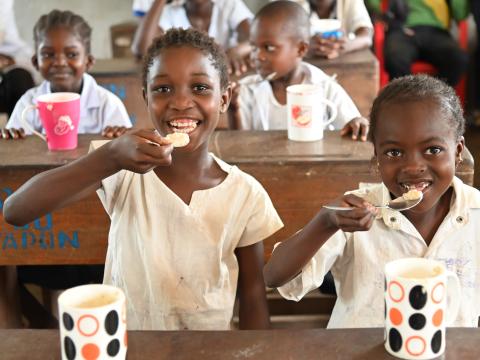DR Congo: School Meal Program in Menkao: A Response to Hunger and Child Malnutrition

By Didier Nagifi, Communications Officer
On Tuesday, May 13, 2025, World Vision DRC officially launched its school feeding program at EP2 Primary School in Menkao, located in the Maluku municipality. This initiative is part of a broader response to hunger and malnutrition that severely affect thousands of children across the Democratic Republic of Congo (DRC), undermining their health, cognitive development, and academic success.
In the DRC, an estimated one in two children suffers from chronic malnutrition. This silent crisis not only hinders their physical growth but also impairs their ability to learn. In response to this nutritional emergency, World Vision DRC, in collaboration with local authorities, teachers, and parents, initiated this program to provide students with a balanced meal at school, thereby enhancing their concentration, attendance, and academic performance.
This intervention in Menkao is part of the broader School Feeding Program that World Vision is implementing in several provinces of the country, including Kasai Central, Kasai, and Tanganyika, with the technical and financial support of partners such as the World Food Programme. Through this multisectoral approach, the organization aims to fight malnutrition sustainably while promoting access to quality, inclusive, and equitable education.
“A well-nourished child can learn, understand, and succeed. Without proper nutrition, even the best teachers are powerless. This program is essential for our children’s future,” said Grégoire, Chief Primary Inspector of Maluku 4, who praised the initiative.
He emphasized the need for sustained action:
“This is not a one-off event. It’s a project that needs to be strengthened, expanded, and sustained. All stakeholders must commit to ensuring that every Congolese child receives a balanced meal at school every day.”
During the ceremony in Menkao, 18 first and second grade students, accompanied by 7 teachers, 5 school officials, 3 community liaisons, a health worker, and 4 political-administrative representatives, participated in an awareness session on the importance of healthy eating.
Fabrice, a nurse at the local health center, highlighted the direct impact of malnutrition on learning abilities:
“A child who comes to school hungry is exhausted. Their brain is on standby, unable to concentrate. To help them succeed, we must first feed them properly.”
He also encouraged the use of locally available resources:
“We have nutritious and accessible foods. Let’s learn to value them instead of relying solely on imported products.”
He further praised the provision of clean drinking water by World Vision, which helps reduce waterborne diseases that affect children's growth.
At the end of the activity, porridge was distributed to the students, symbolizing the organization’s concrete commitment to better nutrition. Bénédicte, a 10-year-old girl, shared her excitement:
“Today, we learned that eating well helps our brain. We ate porridge, I hope we’ll have it every day.”
By implementing this program across several provinces, World Vision DRC takes a decisive step in the fight against hunger and child malnutrition while placing school nutrition at the center of educational policy. The organization thus reaffirms its commitment to ensuring that no child is forced to learn on an empty stomach.